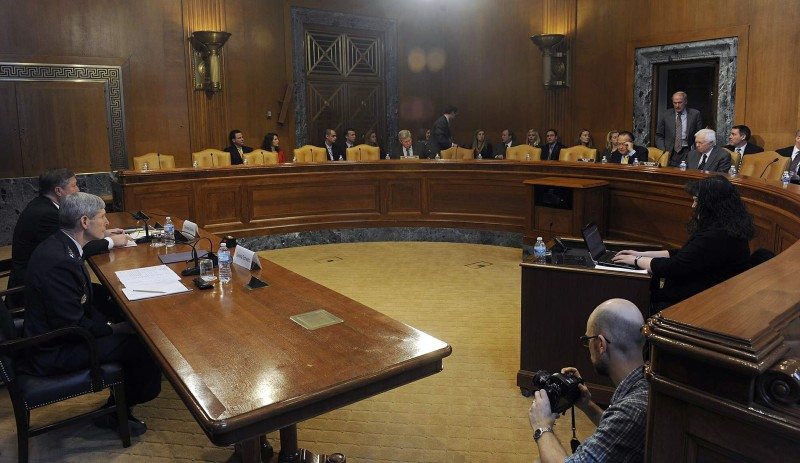Air Force leaders discussed the service’s fiscal 2012 budget request and their concerns about operating under a continuing resolution with members of the Senate and House Appropriations Committees during hearings here March 30 and 31.
In the March 30 hearing before the Senate Appropriations Committee’s Subcommittee on Defense, Secretary of the Air Force Michael Donley said a decision to extend the continuing resolution at fiscal 2010 budget levels through the remainder of this year would have a significant effect on the Air Force.
“Deeper reductions to our modernization programs would be required to fund over $4 billion in must-pay bills for urgent operational needs, like those in Afghanistan and Iraq, and for military health care and the military pay raise of 1.4 percent, which Congress authorized but which has not yet been funded,” the secretary said.
Air Force Chief of Staff Gen. Norton Schwartz echoed the secretary’s concern.
“Without a 2011 appropriations bill, we will have to further reduce flying hours, cancel training and exercise opportunities, delay or cancel weapons systems sustainment and depot maintenance activities, and disrupt a multitude of other day-to-day activities,” General Schwartz said.
The Air Force’s fiscal 2012 baseline budget request of $150 billion, and $16 billion in overseas contingency operations supplemental appropriations, represents a careful balance of resources among Air Force core functions necessary to implement the president’s national security strategy while recognizing the need for fiscal restraint, Secretary Donley said.
“We continue to recognize the requirement for fiscal restraint and are committed to remaining good stewards of every taxpayer dollar, improving management and oversight at every opportunity,” the secretary said.
The fiscal 2012 budget request incorporates over $33 billion in efficiencies across the future-years defense plan, which will be shifted to higher-priority combat capability by reducing overhead costs, improving business practices and eliminating excess troubled or lower-priority programs, Secretary Donley said.
General Schwartz said the fiscal 2012 budget request supports Airmen and their continuing efforts to structure the force for maximum versatility, citing current relief efforts in Japan as one such example.
“Members of the 33rd Rescue Squadron from Kadena Air Base in Okinawa continue to partner with their Japanese Self Defense Force counterparts to conduct search-and-rescue operations,” the general said, adding that special operations Airmen, also from Kadena, worked to open a couple of hard-hit airfields at Sendai and Matsushima.
Concurrent to humanitarian missions in Japan, the Air Force continues to provide valuable support to coalition efforts in North Africa, General Schwartz said.
“F-15Es and F-16CJs, along with a multitude of Airborne Warning and Control Systems, tankers and other support aircraft, joined coalition aircraft from Britain, France and others to help gain control of the airspace, establish a no-fly zone over Libyan opposition forces and protect Libyan citizens from any further harm from Moammar Gadhafi’s regime,” General Schwartz said.
(Master Sgt. Amaani Lyle contributed to this story)










